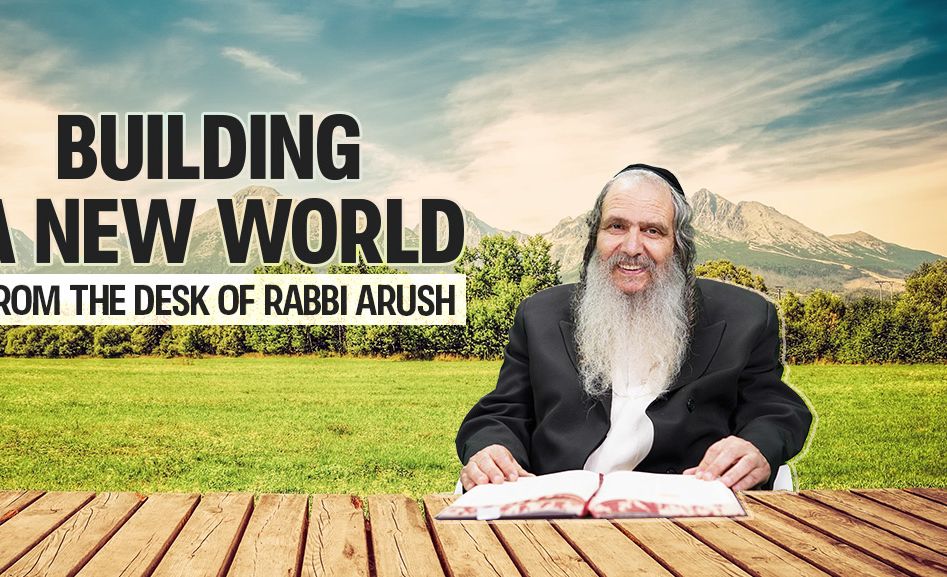
The Sweetness of Judaism
Why do so many people fail to taste the sweetness of Sabbath, the joy of a holiday, the exhilaration of prayer or the satisfaction of understanding a page of Gemara?

Translated by Rabbi Lazer Brody
People don’t realize the sweetness of Judaism! Why? Tasting the sweetness of Torah, prayer and mitzvah observance requires personal holiness. One who prays daily for personal holiness ultimately merits enhanced spiritual sensitivity, understanding of Torah, a better memory, true happiness and an overall sweet life.
Both learning Torah and retention depend on personal holiness. By retention, we’re not simply referring to memory, where he remembers what he learned, but that he retains the constant cognizance of Hashem while he’s learning. Parrot-like rote memory is meaningless; retention, though, is the memory that includes deeper-level comprehension of Torah that in turn binds a person to Hashem. This is the product of learning coupled with personal holiness.
So what if a person learns Torah, yet leaves the Yeshiva, hits the pavement and begins looking at  women?! Such a person has no connection to holiness. He may be wearing tzitzit, putting on tefillin and observing the Sabbath, but without personal holiness he’ll lack any authentic connection to Hashem. It’s time to wake up!
women?! Such a person has no connection to holiness. He may be wearing tzitzit, putting on tefillin and observing the Sabbath, but without personal holiness he’ll lack any authentic connection to Hashem. It’s time to wake up!
The Baal HaTanya, Rebbe Schneur Zalman of Ladi, was known to have said: “I don’t want this world or the next world; I only want You, Hashem! I only want to cling to You!” Such a level and such yearning is the outcome of personal holiness.
Why are people in spiritual hibernation their entire lives? The reason is that the lust for women consumes their heart, brain and all their desire for holiness to the extent that they fall into an abyss of spiritual darkness, tantamount to a cardiac failure on a spiritual level. They feel nothing. They don’t feel how blemished they are. The lower they sink, the more they’ll have to cry out to Hashem in order to rise up and purify themselves. Only then, will they be able to realize where they are in life and to begin to taste holiness.
Rebbe Nachman explains that one’s ability to pray also depends on personal holiness (see Likutei Moharan I:50). With personal holiness, a person can pray “with all his bones”, in other words, with every fiber of his soul. But without personal holiness, one’s prayer is hijacked by the elements of the spiritual dark side; such prayer becomes a “bone for the dog.”
The Tikunei Zohar relates that when a sacrifice in the Holy Temple was accepted on High, one could see the image of a lion in the pillar of smoke that ascended from the altar. But, when the sacrifice was unacceptable, the image of a dog appeared in the pillar of smoke. That’s why Rebbe Nachman likens prayer without personal holiness to a “bone for the dog.” But, with personal holiness, prayer becomes so sweet that a person can pray with every single bone of his body. He savors such prayers and certainly doesn’t rush through them. Every word is like eating a chocolate-covered almond or like licking honey. One who hasn’t tasted the sweetness of prayer hasn’t yet corrected his blemished personal holiness.
A person who guards his eyes tastes the sweetness of Torah as well. He yearns to learn and therefore learns with desire. But, one who doesn’t guard his eyes lacks the desire to open a holy book; he has no vitality in learning Torah and finds it heavy. The latter feels like learning is a punishment. Which would you prefer, the honey or a punishment?
The ones who learn Torah without personal holiness are the ones who commit the crime of Zimri yet seek the reward of Pinchas. Zimri committed a heinous sin of fornication with a Midianite woman, brazenly, in front of all of Israel. His ugly act angered Hashem, to the extent that Hashem wanted to mete out an unspeakable punishment. Pinchas took the initiative, and risked his life to extinguish this raging fire of sin. He entered Zimri’s tent, killing both Zimri and the Midianite woman and as such, assuaged Hashem’s wrath. His reward was the “covenant of peace” – perfect personal holiness and priesthood for posterity.
A person who walks in the street and breaches personal holiness by looking at things that he shouldn’t be looking at resembles a Zimri. Then, if he walks into his yeshiva or kollel, it’s like Zimri walking into the yeshiva or kollel. He might want to learn Torah or feel the delight of Torah, but he won’t be able to, for it’s like committing the crime of Zimri yet seeking the reward of Pinchas. He may look like Pinchas on the outside, with a hat and dark suit, or with beard and sidecurls, but on the inside, he’s a Zimri. One needs a lot of hard work and personal prayer to be a Pinchas on the inside, and to taste the sweetness of Torah that comes from personal holiness.
Anyone who merits guarding his eyes in the street tastes the sweetness of clinging to Hashem. He’s spiritually sensitive, aware of all the dangers that surround him. As he walks in the street, he prays: “Hashem, please help me reach my destination without seeing anything that I shouldn’t. Help me guard my eyes along the way, so that nothing should tempt me to open them. Don’t let me lose my holiness.” A person like this feels the sweetness of clinging to Hashem, for he won’t walk in the street without asking Hashem to be with him and protect him. If this is the way he feels in the street, imagine how he feels while praying! His life is paradise and his Judaism is sweeter than honey. May everyone so merit, amen!







Tell us what you think!
Thank you for your comment!
It will be published after approval by the Editor.